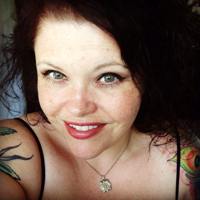My dear neighbors, I can stay silent no longer.
Through the paper walls of this old building, I can hear you. Perhaps if it were anyone else in this unit, the raised male voice would go completely unnoticed.
Sadly, it rings loud and clear for me, stirring years of memories.
I grew up in a yelling house. I spent my childhood listening to my parents tear each other down with words.
Perhaps it’s because you have a little daughter that I feel compelled to tell you what feels like to be a little girl in a yelling house: it’s absolutely terrifying.
Your baby may be too young to directly understand the words you say, but she is very perceptive of the energy in your home. When you rage in her space, she feels it—the contempt, the anger, the anxiety, the turmoil and tension—she feels it all. You are teaching her that this fear, this discomfort, this feeling of impending doom is normal.
This aggressive energy will start to feel like home to her.
If you fight about money, she might think it is because she asked for something at the store that day. If you fight about the house being dirty, she might believe that it was because she made a mess. Even though your anger and arguing probably have nothing to do with your sweet little girl, she will internalize it in some way.
That’s just what kids do.
This creates a constant feeling of guilt, shame, and a belief that she might just be the reason why mom and dad are so mean to each other.
The problem with yelling is that it becomes so normal that we don’t even realize we’re doing it. If you’re yelling at your partner, chances are you will be yelling at your daughter as well. If you use your words in anger, you can only bring her harm.
If you tell a child that she is bad, stupid, incapable, or worthless, she will believe you. She will believe you so completely that she spends the rest of her life proving you right. When you berate a child, the words you use become their truth. Their inner dialogue is written in the words you speak to them.
The worst part of growing up in a yelling house for me, was that I continued that pattern with my own children. I had learned that he who yells the loudest “wins.” Because I had grown up in a yelling house, it took me years to realize that my children did not need to listen to that every day.
They heard things in our home that no child ever should, and that is one of my deepest regrets as a mother.
All of this negativity became my normal, so I never considered that there was a more loving alternative.
I didn’t realize that it wasn’t acceptable for my ex-husband to speak to me in unkind ways. I didn’t know that retaliating in kind was also unacceptable. It was all I knew. It’s embarrassing to look back on the way we spoke to each other. Thankfully, that pattern in my life ended with that relationship.
After moving out of my own yelling house, I made a very important house rule for my teenagers and me. I hung a big whiteboard in our kitchen and wrote on it “Be Kind or Be Silent”.
Naturally, it wouldn’t have been enough to demand kind speech from my children. I had to lead by example. When I felt the urge to raise my voice, I would hug my child and say, “I don’t want to argue with you right now. Let me think about this for a little while.”
If one of my children spoke in an unkind tone, I would look at them and say, “Please don’t speak to me that way.” Usually, that was all it took. If that didn’t work, I would suggest that they cool off and we would continue the conversation when they could do so with a pleasant tone of voice.
One of my favorite mom-isms during that time was, “I want you to express yourself, but I need you to do it in a respectful way.”
I wanted my children to learn that I valued what they had to say. I wanted to make sure they felt heard, and validated, and loved.
I wanted to teach them that when people are yelling back and forth at each other, no one is really listening. I had to show them that it’s just not possible to have a productive conversation in that manner.
Most of all, I wanted them to know that our words are powerful: we can’t take them back once they are spoken.
It is my hope that I helped to teach them that it is not necessary to resort to yelling and hurtful words to make a point—there is no prize to be won in yelling the loudest, or making the deepest cut with our words.
In this house, we love one another. We treat each other with kindness and respect—and this is shown through words and actions. Because our interactions are loving and peaceful, the energy in our home is peaceful. There is no room for tension or stress here—there is too much love in our space to allow room for such things.
My dear neighbors, it’s not too late to change this. You have many more years to show your daughter what kind, loving words sound like. You will have many opportunities to show her how mommy and daddy can resolve a conflict without hurting each other. There are countless days to fill your home so full of love that tension, stress, discord, and yelling just simply will not fit there.
Every child deserves to feel safe and secure in their space. Every child deserves to be spoken to with kind words.
Every child deserves to see Mom and Dad interacting in respectful, loving ways—consistently.
The interactions she experiences at home will be the experiences she searches for in her own relationships. You are not just arguing in front of your child- you are actually shaping who she is, coloring her self-perception, and writing the script that she will repeat in her mind for many years to come.
Words are powerful and we need to choose them wisely for everyone’s benefit—and if we can’t be kind with our words, silence may be a wiser choice.
Author: Renée Dubeau
Editor: Renée Picard
Photo: Amanda Wood/Flickr







Read 1 comment and reply